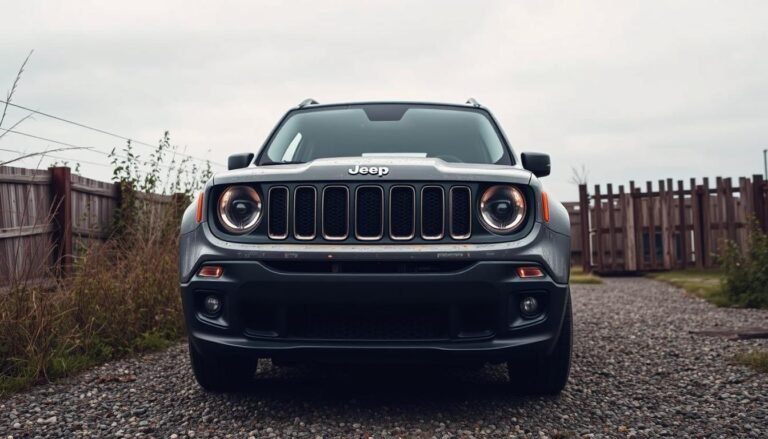Common Issues Problems With Jeep Grand Cherokee Owners Face
What are the common problems with Jeep Grand Cherokee? Owning one, you might face different issues as time goes by.
The Grand Cherokee is famous for its strong build and amazing off-road powers. But, even this tough SUV can run into some problems.
It’s important to know these issues to keep your ride smooth and dependable. This article shows you the main problems reported by owners.
These range from transmission troubles to electrical issues. Knowing these problems helps you avoid them. We aim to give you helpful tips and solutions for these concerns.
If you love Jeeps or are buying your first one, being well-informed is crucial. Let’s look at the most common issues.
We’ll also explore ways to ensure your Jeep Grand Cherokee stays in top form both on the road and off it.
Introduction To Common Jeep Grand Cherokee Problems
The Jeep Grand Cherokee is a popular choice for its versatility and comfort. If you own one, it’s essential to know about common issues that might pop up.
Being aware of these can make your driving experience better. Issues with the Jeep Grand Cherokee often include mechanical and electrical problems.
These can affect how the vehicle runs and how reliable it is. By spotting and fixing these issues early, you can keep your Jeep in top shape.
Knowing about these common problems means you can have a worry-free drive. With this knowledge, you can address any issue quickly.
This ensures your Jeep remains a reliable partner on all your journeys.
Transmission Problems in Jeep Grand Cherokee
Jeep Grand Cherokee owners often face transmission problems. It’s crucial to spot these issues early. This prevents bigger problems.
Transmission troubles are common in these vehicles and can cost a lot to fix if ignored.
Common Symptoms of Transmission Issues
Look out for these signs of transmission problems in your Jeep Grand Cherokee:
- Harsh or abrupt shifts during acceleration.
- Slipping of gears while driving.
- Unusual noises, such as grinding or whining sounds, when shifting.
- Dashboard warning lights illuminating, particularly the check engine light.
- Delayed engagement when shifting from park to drive.
Preventive Maintenance For Transmission Health
Keeping your Jeep Grand Cherokee’s transmission in good shape is key. Regular maintenance can prevent many issues.
To keep your transmission healthy, consider these steps:
- Schedule timely transmission fluid changes based on your vehicle’s service manual recommendations.
- Consider installing an auxiliary transmission cooler to manage heat effectively.
- Conduct inspections to ensure that the transmission control module software is up-to-date.
- Monitor shifting behavior regularly and address minor issues before they escalate.
By sticking to these tips, you can avoid transmission problems in your Jeep Grand Cherokee.
Electrical System Glitches Reported by Owners
Many jeep grand cherokee owners have issues with their electrical systems. A big problem is the infotainment systems not working right.
Knowing how to fix these problems can save you both time and cash.
Malfunctioning Infotainment Systems
Problems with the infotainment system can vary. You might see screens freezing, touch controls not responding, or sound issues.
Keeping your infotainment system updated is key. If updating doesn’t fix it, try resetting it or get help from a pro.
Resolving Battery and Alternator Issues
Starting troubles and failing electronics often come from bad batteries or alternators. Start by checking the battery’s connections.
Sometimes, charging a weak battery helps. If not, test the battery and alternator. Changing them if they’re bad helps fix and prevent issues.
Suspension and Steering Concerns
Jeep Grand Cherokee owners often face issues with their suspension and steering. These problems can impact how well the vehicle drives.
Spotting these issues early is key to keeping your Jeep safe and running smoothly. Recognizing the problems and finding the right fixes are important steps.
Signs of Suspension Trouble
Look out for these signs of suspension problems:
- Clunking or knocking noises while driving over bumps
- Uneven tire wear, which can signal misalignment
- Vibrations felt in the steering wheel
- Difficulty in handling or a feeling of instability when turning
- Excessive bouncing or swaying during driving
Solutions For Steering Issues
Here’s how you can fix common jeep grand cherokee steering problems:
- Regular inspections of suspension components, including shocks and bushings.
- Performing four-wheel alignments to ensure optimized handling.
- Replacing worn-out shocks or struts when necessary.
- Maintaining proper tire pressure to prevent uneven wear.
- Consulting with a professional mechanic for complex steering repairs.

Taking care of your Jeep’s suspension and steering improves your drive and reduces future issues.
Regular check-ups ensure your vehicle stays in top shape and helps dodge expensive repairs later.
Engine Performance Issues in Jeep Grand Cherokee
Engine problems in the Jeep Grand Cherokee can cause jeep grand cherokee concerns.
Owners face issues like stalling, poor acceleration, and high oil use. To fix these, understanding and regular care are key.
Identifying Engine Stalling and Poor Acceleration
To spot engine problems, look for certain signs. These include:
- Power loss while driving
- Engine runs rough or shuts off often
- Car turns off during slow driving
- Slow response when pressing the gas pedal
If you have a 5.7L HEMI engine, watch out for cylinder head problems. Staying alert helps prevent more damage.
Maintenance Tips To Enhance Engine Performance
Regular check-ups are key to keeping your engine running well. To fight common jeep grand cherokee problems:
- Change oil on time with good motor oil.
- Use quality fuel for better engine work.
- Check and change spark plugs to start your engine right.
- Keep air filters clean for better air flow.
- See a mechanic at the first sign of trouble.
HVAC System Failures and Their Impact
The HVAC system is key for a comfy drive in your Jeep Grand Cherokee, no matter the weather. When it doesn’t work right, your comfort takes a hit.
You might notice the temperature acting up, like getting hot air when you expect cold.
Knowing about these problems helps fix them better. Make sure to check your system often so issues don’t get worse.
Common HVAC Problems
- Inconsistent temperature control
- Heater blowing cold air
- Air conditioning not functioning
- Unusual noises from the HVAC system
Fixes For Heating and Cooling Malfunctions
Fixing HVAC problems usually start with easy steps. Always check and swap out air filters for better air flow. If troubles keep up, the blend door actuator might need looking at.
If issues remain, get a pro to check it. This can help find deeper problems causing trouble for your Jeep Grand Cherokee.

Fuel System Issues Affecting Performance
Fuel system issues can really affect how your Jeep Grand Cherokee drives. If fuel pumps fail or fuel injectors get clogged, the engine won’t perform well.
This can lead to expensive repairs. Older models are more likely to have these issues, so it’s important to keep an eye out.
Identifying Fuel Pump Failures
A bad fuel pump shows certain signs. You may see:
- Difficulty starting the engine
- Engine stalling or misfiring
- Poor acceleration and power
If these problems pop up, you should check the fuel pump. Listening for strange sounds or doing pressure tests can help find issues early.
Maintaining Fuel Injector Health
Fuel injectors are key to getting fuel to the engine properly. Keeping them in good shape can prevent problems.
Here are some tips to maintain your fuel injectors:
- Use high-quality fuel to avoid build-up.
- Get them cleaned regularly, as your mechanic suggests.
- Check for leaks or clogging now and then.
Staying on top of your fuel system’s health can keep your Jeep Grand Cherokee running smoothly.
Common Issues with Jeep Grand Cherokee
If you own a Jeep Grand Cherokee, you might face various issues. Stalling and the check engine light coming on are major concerns. These problems can be due to bad sensors or ignition failures.
It’s crucial to get regular check-ups to catch problems early. This can stop more damage to your engine and its parts.
Stalling and Check Engine Light Problems
Stalling can happen suddenly and is scary and unsafe. If the check engine light comes on with stalling, it means there’s a problem.
Reasons for this can include:
- Faulty ignition coils
- Malfunctioning spark plugs
- Air intake issues
- Fuel delivery problems
Addressing Engine Misfires and Sensor Failures
Engine misfires are a big headache for Jeep Grand Cherokee owners. They occur when the engine doesn’t burn fuel correctly, causing loud noises and less power.
Often, this is due to sensor problems, especially with:
- Oxygen sensors
- Mass air flow sensors
- Engine control module (ECM) issues
Knowing these issues and fixing them quickly can improve your driving and make your vehicle last longer.

Unexpected Acceleration Problems
Sometimes, unexpected acceleration issues surprise drivers. These problems might come from clogged fuel injectors, dirty air filters, or transmission faults.
To fix these jeep grand cherokee issues, you need to be careful. Regular maintenance can greatly improve how your vehicle works.
It’s important to know why these problems happen. This knowledge lets you fix jeep grand cherokee issues well.
Common Causes of Poor Acceleration
- Clogged fuel injectors limit fuel flow to the engine.
- Dirty air filters reduce airflow, impacting engine efficiency.
- Transmission problems can hinder the car’s ability to shift gears smoothly.
- Ineffective spark plugs may lead to misfiring, affecting acceleration.
Mitigating Acceleration Setbacks
Taking good care of your vehicle helps it respond better. Focus on the following steps:
- Replace air filters regularly to ensure maximum airflow.
- Clean fuel injectors to maintain optimal fuel flow.
- Check and replace spark plugs as needed to prevent misfires.
- Conduct routine transmission fluid changes to avoid faults.
Death Wobble in Jeep Grand Cherokee
“Death wobble” is when your steering wheel shakes a lot, especially when driving fast. It’s often because of issues like worn-out suspension parts, the wheels not being aligned right, or tires not balanced properly.
Fixing these problems is critical for both a smooth ride and safety.
Learning The Causes of “Death Wobble”
Many things can cause death wobble. Some main reasons are:
- Worn suspension parts, such as control arms or bushings, can reduce stability.
- If the wheels aren’t aligned correctly, it can make the tires wear out unevenly and handling can get tricky.
- Not having balanced tires can cause shaking when you drive fast, making things worse.
- If steering components are loose or damaged, it can be harder to control your vehicle.
Solutions To Mitigate Steering Instability
To deal with death wobble, you can take several steps. To reduce common problems in jeep grand cherokee, you can:
- Check suspension components carefully and replace parts that are worn out.
- Make sure your wheels are aligned right to prevent uneven tire wear.
- Get your tires balanced often to avoid shakes at high speeds.
- Look over your steering system for any loose parts and fix or replace them as needed.

Battery Issues and Quick Drain Problems
Jeep Grand Cherokee owners often face the hassle of their batteries draining quickly. It helps to know the common issues linked to battery problems for easier troubleshooting.
Figuring out what causes these problems is key to fixing them.
Causes of Rapid Battery Drain
Many things can cause your vehicle’s battery to drain quickly. These include:
- Aging batteries that can’t hold a charge anymore.
- Faulty alternators that don’t charge the battery well.
- Electrical leaks that happen when the car is off.
- Battery connections that are corroded.
Testing and Replacing The Battery
It’s vital to regularly check your battery and alternator to keep your car running smoothly.
Follow these steps:
- Use a multimeter to measure the battery voltage; it should be about 12.6 volts.
- Look for any corrosion or loose connections.
- Replace the battery if it’s old or damaged.
- Have a pro check the alternator if you’re still having battery issues.
Compromise these common problems and how to fix them can help you keep your Jeep Grand Cherokee’s battery in good shape.
Conclusion
The Jeep Grand Cherokee stands out for being strong and flexible. Yet, it’s not perfect and faces some issues.
Owners might deal with transmission problems to glitches in the electrical system. These can affect the car’s performance and reliability.
Regular maintenance is key for Jeep Grand Cherokee owners. It helps you stay ahead of potential issues.
From improving engine performance to fixing battery problems, knowing what might go wrong helps you fix issues early.
Being alert to these common problems helps keep your Jeep Grand Cherokee running well. This ensures it lasts longer and remains enjoyable to drive.
With careful attention, you can keep enjoying this special car’s unique driving experience.
FAQs
Q: What are the most common problems with the Jeep Grand Cherokee?
A: The Jeep Grand Cherokee often faces issues like faulty transmissions and glitches in the electrical system. Problems also include steering and suspension troubles, engine issues, and troubles with the HVAC and fuel systems. Additionally, stalling, sudden acceleration, and battery drain are common.
Q: How can I troubleshoot transmission issues in my Jeep Grand Cherokee?
A: Notice if gears slip or shift harshly. Keep up with fluid changes. Adding an extra transmission cooler helps, too. If problems stay, it’s best to see a mechanic.
Q: What should I do if my Jeep Grand Cherokee’s electrical system is malfunctioning?
A: First, check if the battery is good and connections are clean. Updating the infotainment system might help. If problems don’t go away, getting a pro to check it might be wise.
Q: How can I maintain my Jeep Grand Cherokee’s suspension and steering system?
A: Make sure to check shocks and bushings regularly. Get your wheels aligned too. If you hear strange noises or see uneven tire wear, it’s time to check your car.
Q: What can cause engine performance issues in the Jeep Grand Cherokee?
A: Using old oil or cheap fuel can mess with the engine. Engine problems might also come from failed parts. Changing oil often keeps your engine running smoothly.
Q: How do I resolve HVAC system failures in my Jeep Grand Cherokee?
A: Start by checking the air filters and the blend door actuator for cooling issues. For big problems, a mechanic’s inspection might be needed.
Q: What to do if my Jeep Grand Cherokee is stalling and the check engine light is on?
A: Stalling and warning lights often suggest sensor or ignition troubles. Getting regular engine scans and fixing problems quickly is key to a healthy engine.
Q: How can I prevent unexpected acceleration problems?
A: Keep up with your car’s maintenance, like cleaning the fuel system and changing filters. This can fix acceleration problems caused by clogged parts.
Q: What should I do if I experience “death wobble” in my Jeep Grand Cherokee?
A: If your car starts to wobble, don’t wait. Check and replace any old suspension parts right away. Making sure your car is aligned correctly also helps with this scary problem.






